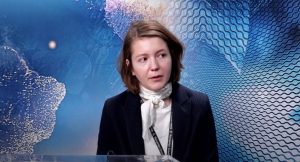
 Video
Video
Two days only after PNTCD (National Christian and Democratic Peasant party) made a big step towards its rebirth, in PNL (National Liberal Party) a crisis seems to start. Horia Rusu, one of the most well known Valeriu Stoica’s opponents, announces his intention to run for the position of president of the party. Horia Rusu motivates his gesture in an unequivocal way. There is, among the majority of the Liberals, a certain frame of mind "favoring a reconsideration of the political direction of the party", the Liberal leader affirms, accusing, at the same time, the current leadership of "oscillating and ambiguous" behavior.
The resumption within the party of the public accusations directed towards Stoica’s team, after a period when the prim vice-president’s supremacy in the party seemed to be beyond doubt. The Congress to take place in ten days should only have sanctioned it, conferring him the presidential position. It’s hard to believe it won’t happen, but Horia Rusu’s gesture is not at all meaningless. On the contrary.
Concluding his motivation, Horia Rusu gets exactly to what could, in the future, represent the Liberals biggest problem. That is PNL’s position on the political stage and its doctrinal coherence. Few are those who could reproach Valeriu Stoica lack of political intelligence and ability. His success in the local elections and, afterwards, even if not at the expected level for some, in the parliamentary elections, Theodor Stolojan’s promoting (with significant results) as the party candidate for the presidential elections, all this is mostly due to him. But the future of the party is a different story and the first signals are not very convincing. Though it is the only Right wing party in the Parliament, PNL already appears as the most comfortable adversary of the current power, ideologically situated on the left side of the political stage. It is only the beginning of a mandate, but yet, it is not clear at all what direction Valeriu Stoica wishes lead the party. It is a serious dilemma.
If at PNL’s right things would be calm and quiet, the party shouldn’t have no trouble. With a captive electorate in that area of the political stage, PNL might successfully play the card of the destroyed Opposition, for the sake of some definite advantage, with reasonable compromises with the current power. But who can guarantee that the Right is reserved to the Liberals? Nobody, not now. The big change in PNTCD these days is not a question of replacing people, not even the replacing of the whole leadership, not the leadership of the last eleven years, but a question of real doctrinal reform. PNTCD will be from now on a real Rightwing party, Christian and democratic, or it won’t be at all. What will PNL’s position, than? Will Valeriu Stoica’s politics still be successful, that of compromise with the Left and vociferating from the Right? Hard to believe. PNL’s problem will become a problem of ideological positioning. A really tough problem.
The experience of the more advanced countries in Central and Eastern Europe show that the parties that claim to be Liberal knew a constant decline. Out of reasons exclusively related to the post-communist transition specific nature, the liberal parties in these countries became marginal or they doctrinally redefined themselves, embracing, accordingly, conservatory, democratic-Christian, civic or social-democratic values. Obviously, the phenomenon could be seen from another perspective too. More or less explicitly, all the other differently directed parties introduced in their programs elements of Liberal ideology. Pure Liberalism is, anyway, hard to find in the programs and messages of the parties that resisted and registered achievements in the last years in the advanced countries of the Central and Eastern Europe.
PNL will have to seriously approach this challenge. Beyond Valeriu Stoica’s talent to juggle among adversaries, friends or political competitors, PNL needs a serious talk about the direction to follow and the ideology to embrace. In front of an important segment of the electorate, the advantage to be more visible as a parliamentary party could fail, from a certain moment on, in front of some party’s doctrinal coherence and radicalism, a Right one too but non-parliamentary.
(Pavel LUCESCU)